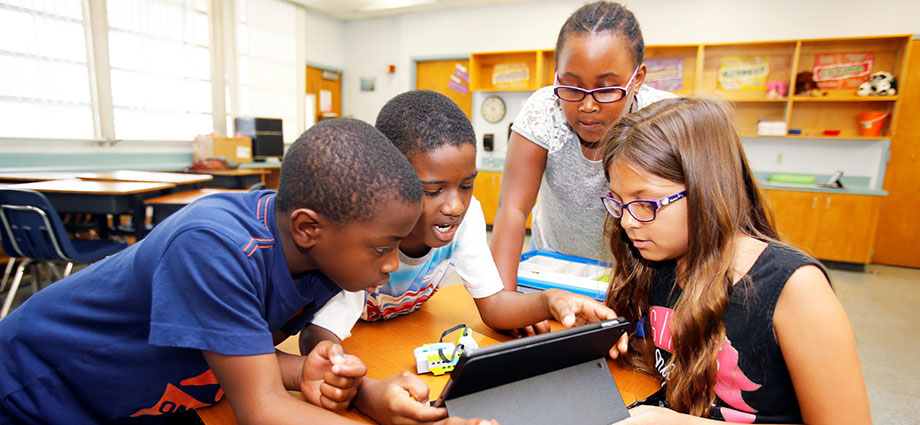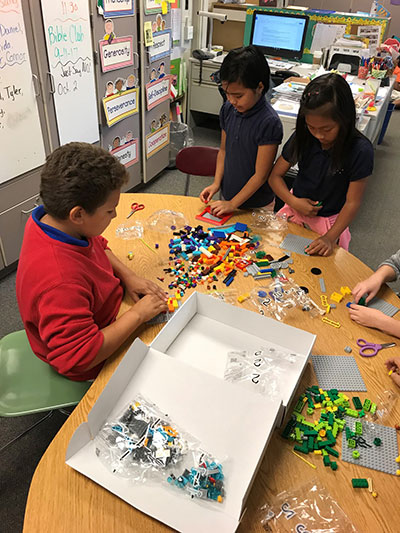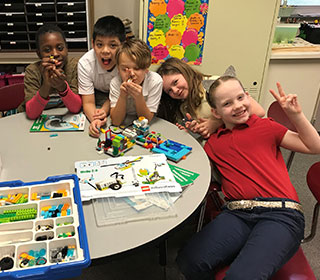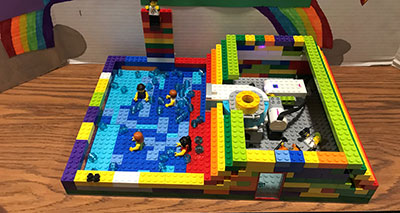The Whole Child Curriculum Hidden in STEM Project-Based Learning

Editor’s note: Jonathan recently shared his classroom experience using STEM-oriented project-based learning with other educators at the Association for Supervision and Curriculum Development (ASCD) conference, Empower18. Below, he shares key takeaways from his powerful presentation session.
When I first started teaching, I never imagined that a STEM robotics program would be a fantastic way to help build reading, critical thinking, a nd collaboration skills, engage a diverse set of students so deeply, and develop the whole child. But that is exactly how this program transformed my fourth-grade classroom.
nd collaboration skills, engage a diverse set of students so deeply, and develop the whole child. But that is exactly how this program transformed my fourth-grade classroom.
STEM-oriented project-based learning experiences can have a remarkable impact on developing a student’s skills and confidence – not just in the STEM areas, but also in building reading, writing, researching, and social-emotional skills. I’m sharing my takeaways to show how this type of program can engage your students who may be struggling at reading and writing, and bring about remarkable growth.
Challenges to Motivating Student-Led Learning
I’m a teacher at Gossler Park School, a Title 1 elementary school in Manchester, New Hampshire. The population can be transient as job and housing opportunities come and go.
My students are wonderful. They are creative, talented, and eager to grow. Many of our kindergarteners start behind grade level in reading and math; when they reach my fourth-grade classroom, they’re at varying reading levels. I also teach several English language learners. My students therefore struggle to work together, and some become frustrated and unmotivated when presented with traditional assignments.
As a “Leader in Me” school, working to become a Lighthouse School, it’s very important to my Gossler Park colleagues and I that students are intrinsically motivated and take ownership of their learning. We are always looking for curriculum that engages the whole child and develops leadership, responsibility, problem solving, communication, and teamwork. However, much of the curriculum we see does not do that, since the typical material:
- Does not engage students deeply or encourage them to put it to use.
- Tends to harm the confidence of students working at lower grade levels when they struggle to keep up or compare themselves to their more-advanced peers.
- Does not encourage collaboration between those who can keep up and those who are struggling.
- Does not provide an authentic experience with goals that hold students accountable.
Bringing Growth and Engagement Through Project-Based Learning
As part of our efforts to move towards student-led learning using project-based learning, our school district began working a few years ago to implement FIRST programs in the classroom. Because I had run an afterschool FIRST LEGO League program at my prior school, I was asked by my principal to help implement the program at Gossler Park. We ultimately found that FIRST LEGO League Jr., which is a program designed for students from K-4, met the needs of our fourth-grade students.
 FIRST LEGO League Jr. is a STEM-oriented project-based learning experience that involves robotics and a real-word theme, which changes each year. This year, the topic was the human water cycle. Students learned about our water system and researched a topic of their choosing related to the theme. They documented their research on a Show Me poster. They also built a simple model using the LEGO WeDo robotics platform that demonstrates a concept related to the theme, and programmed it with a block-based programming language. Students worked toward an expo, where they presented their research and robot to the community.
FIRST LEGO League Jr. is a STEM-oriented project-based learning experience that involves robotics and a real-word theme, which changes each year. This year, the topic was the human water cycle. Students learned about our water system and researched a topic of their choosing related to the theme. They documented their research on a Show Me poster. They also built a simple model using the LEGO WeDo robotics platform that demonstrates a concept related to the theme, and programmed it with a block-based programming language. Students worked toward an expo, where they presented their research and robot to the community.
All of my students embraced the FIRST LEGO League Jr. experience. The fact that they were “playing” with LEGO bricks and coding robots to move got them excited and kept them focused and driven. Robotics was a new experience for our students; therefore they started with a level playing field. They were thrilled every single time they made the robot move. Seeing their motivational light bulb turn on was priceless for me as a teacher. But even more than that, I was amazed by the passion and gains they showed in working on the research portion. Here’s where I saw the greatest improvements in my students:
- My students learned to ask good questions. This was a full-scale research project for my students, so they learned research skills like how to take notes while reading and how to explore deeper by asking questions. For example, a question about who invented the faucet led to another question: What did people do before hot water? My students were eager to find out.
- My students learned to collaborate and work on a team. Many of our students are not able to participate on athletic teams. Kids need opportunities to learn social skills from teamwork in a safe environment with a common goal. Being on a FIRST LEGO League Jr. team was great exposure to dealing with not getting their way on a team, or having to find solutions that everyone can agree on. They learned to figure it out and work together.
- My students read to understand. Researching for the project taught them the importance of reading carefully. We saw improved reading and writing skills. I had students who don’t consider themselves “writers” writing full pages of information because of their self-interest in the topic. They were also able to apply what they learned outside of the project. Recently, we were discussing a TIME For Kids news article about the drought in Cape Town, South Africa, with active listening and responses. My students were shocked to learn that the population will soon be reduced to 6.5 gallons of water per day. One student said, “That’s two toilet flushes.” Another noted, “We use 40-100 gallons to wash a car.” We were able to reconnect with our water source and the importance of learning about preserving it.
- My students learned responsibility. I’ll admit: It was pretty scary at first to give 1,000-piece FIRST LEGO League Jr. kits to fourth graders. There was one day when three kits went flying. They learned how to manage clean up and organization and were given another chance to develop responsibility. After all, if pieces are missing, it takes away from their enjoyment.
- My students persevered through challenges. Some of my students, who have faced so much adversity in their lives, can be quick to quit on things they they’ve failed at in the past. With FIRST LEGO League Jr., we saw them really working hard and persevering. It reminded me of Angela Duckworth’s book, Grit, and the importance of trying, failing, and learning in a safe environment.

- My students worked toward a goal. With a date set in advance for our showcase event, students had to learn to manage their time to get their presentation and model ready. This also led to improved behavior and attendance so they didn’t miss out. The expo also gave students a chance to practice public speaking. Many of our students rarely interact with adults outside of their home or school, so the event gave them a chance to be a subject expert and share what they have learned. They showed pride in what they learned and created – and I was proud of them.
With any project-based learning experience, stepping back and letting the kids take ownership of their learning can be difficult and scary for a teacher. However, the rewards can be great.
My students learned a lot, and so did I. I already knew I loved how robotics increases STEM interest and skills like coding, but my students taught me that STEM project-based programs like FIRST LEGO League Jr. can also have remarkable - and somewhat unexpected – benefits. I saw an increase in reading and writing skills, increased student engagement for students who typically struggle in the classroom, and development of important skills like collaboration and problem solving that address the needs of the whole child.
Jonathan Carpenter is a 4th grade teacher at Gossler Park School in Manchester, New Hampshire, where he’s been teaching for the past four years. Previously, he taught English in South Korea, spent three years in various roles at SHAPE American Elementary in Belgium, and five years teaching in Anne Arundel County, Maryland. He has his Masters in Elementary Education and a Masters in School Administration.
If you have an inspiring story or piece of wisdom that you’ve picked up through your experiences in the FIRST community, please reach out to us at inspire@firstinspires.org and inquire about becoming a guest contributor for Inspire.


